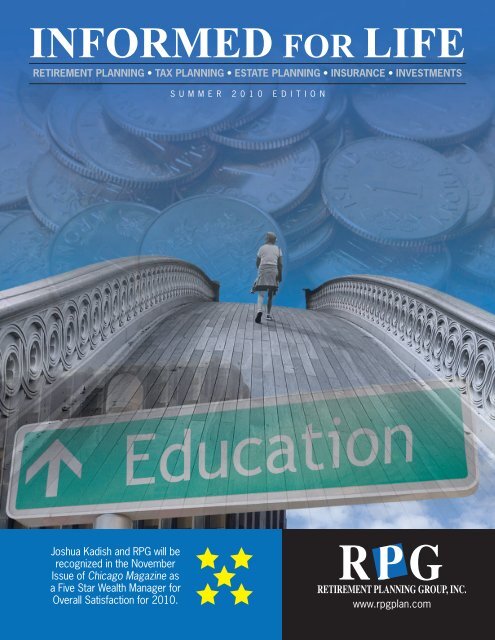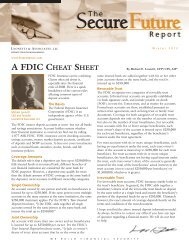INFORMED FOR LIFE - Advisor Products
INFORMED FOR LIFE - Advisor Products
INFORMED FOR LIFE - Advisor Products
You also want an ePaper? Increase the reach of your titles
YUMPU automatically turns print PDFs into web optimized ePapers that Google loves.
<strong>IN<strong>FOR</strong>MED</strong> <strong>FOR</strong> <strong>LIFE</strong><br />
RETIREMENT PLANNING • TAX PLANNING • ESTATE PLANNING • INSURANCE • INVESTMENTS<br />
S U M M E R 2 0 1 0 E D I T I O N<br />
Joshua Kadish and RPG will be<br />
recognized in the November<br />
Issue of Chicago Magazine as<br />
a Five Star Wealth Manager for<br />
Overall Satisfaction for 2010.<br />
www.rpgplan.com
SUMMER 2010<br />
Informed for Life<br />
Clients and Friends:<br />
We’re pleased to provide you with our latest newsletter, Informed for Life.<br />
Informed for Life is intended to be a bridge between<br />
education and action. Our goal is to help educate you<br />
on topics that are relevant and provide you with the<br />
ability to take action on what appeals to you.<br />
As you know, Retirement Planning Group provides<br />
erge service across 5 core areas:<br />
RETIREMENT PLANNING<br />
TAX PLANNING<br />
ESTATE PLANNING<br />
INSURANCE<br />
INVESTMENTS<br />
Each quarterly issue will include a timely article on<br />
each of our core services. There will then be a follow<br />
up action that you can take for additional information.<br />
As it’s been said, “None of us plan to fail.<br />
We merely fail to plan.”<br />
We’re happy to be able to provide you with yet another<br />
educational tool and hope you will find this newsletter<br />
interesting and helpful for your life planning.<br />
Regards,<br />
Concierge Service Directory<br />
1.800.596.0253<br />
For Service<br />
To schedule an appointment or<br />
get directions to our office:<br />
Director of First Impressions - x100<br />
For questions on new account<br />
paperwork or account transfers:<br />
Operations Associate - x155<br />
For check requests, account values,<br />
tax information, to place a trade, change<br />
your email, phone number or address:<br />
Team Leader - x117<br />
For Planning Advice<br />
Press "0" and ask for your financial planner<br />
Joshua Kadish & Scott Loochtan<br />
Award is based on a survey conducted by an independent third party. The opinions of those<br />
who responded to the survey may not be representative of the experience of others. The<br />
Five Star award is not based on investment performance nor is it an indication of future performance.<br />
Respondents were not paid to participate in this survey.<br />
Registered Representatives offer securities and advisory services through<br />
National Planning Corporation (NPC), Member FINRA/SIPC, a Registered<br />
Investment Adviser. Additional advisory services offered through Advantage<br />
Investment Management (AIM), a Registered Investment Adviser. RPG,<br />
AIM and NPC are separate and unrelated companies.<br />
2<br />
www.rpgplan.com
INVESTMENT<br />
Tired of low CD and money market rates?<br />
If you have money sitting in CD’s or money market<br />
accounts, no doubt you have noticed that interest<br />
rates have been dropping for months now much to<br />
the frustration and chagrin of aggressive savers.<br />
Before you decide to move away from traditional<br />
bank savings and CD accounts, it’s important to<br />
think about how much additional risk you are willing<br />
to assume in your new short term savings vehicle.<br />
If you want maximum protection from loss and do<br />
not want to take on additional risk, then it’s best to<br />
stick with FDIC-insured options. But if you’re willing<br />
to take slightly more risk or give up some liquidity<br />
(degree of immediate access to your money), that<br />
may enable you to get a higher potential rate of<br />
return, while still being comfortable with the<br />
amount of risk you are taking.<br />
We have a number of different strategies<br />
available, including:<br />
1. FDIC insured & principal protected<br />
structured CDs with returns linked to<br />
securities or indices of your choice, such<br />
as the S&P 500.<br />
2. Institutional Capital Preservation Portfolios<br />
3. Fixed Income Bond Portfolios<br />
For cash or income-producing alternatives,<br />
give us a call. 1.800.596.0253<br />
Principal Protected CDs are sold only by prospectus<br />
and may not be suitable for all investors. Investors<br />
should read the Prospectus carefully before investing.<br />
Investors should read the prospectus carefully for a<br />
more complete description of the risks associated<br />
with investing in principal protected CDs. This communication<br />
is prepared solely for informational purposes<br />
and should not be considered an offer to buy<br />
or sell or a solicitation to buy any security. Investors<br />
should consult their accounting, legal or tax advisors<br />
before Investing. Many factors may affect investment<br />
value such as interest rates, volatility of the underlying<br />
asset, trading market and time remaining until<br />
maturity. FDIC insurance does not apply to principal<br />
losses incurred when selling a CD in the secondary<br />
market prior to maturity. An active trading market<br />
may not develop.<br />
The S&P 500 is an unmanaged stock index. S&P<br />
500 is a registered trademark of Standard & Poor's<br />
Corporation. Investors cannot invest in the S&P 500<br />
Index.<br />
RETIREMENT PLANNING<br />
Build Your Financial Foundation with Regular Reviews<br />
Life in the 21st Century offers many exciting challenges<br />
and opportunities. Recent market volatility<br />
and a struggling economy may have thrown you off<br />
track to accomplish some of your goals.<br />
www.rpgplan.com<br />
Today, there are many financial strategies that can<br />
help you reach your short and long-term goals. We<br />
can be a valuable resource as you review your<br />
financial situation, ascertain your progress, and<br />
Continued on page 6<br />
3
INVESTMENT<br />
The Importance of Reviewing Your Portfolio<br />
There are many lessons to be learned from the<br />
2008-2009 financial crises. For individual investors,<br />
the most important lessons come out of a complex<br />
theory of investing called Modern Portfolio Theory.<br />
In its most basic form, this theory stresses the<br />
importance of diversifying your portfolio among<br />
different asset classes for safety. As the old saying<br />
counsels, “Don’t put all your eggs in one basket.”<br />
Unfortunately, diversification was proved not to be<br />
as effective as believed and the baskets failed<br />
many investors when they needed them to protect<br />
the eggs the most.<br />
Does this mean that we should abandon the theory<br />
of diversification? Absolutely not! Diversification has<br />
been useful over the long term. But investors may<br />
need to find another way to protect portfolios from<br />
the short term shocks. Investors need to recognize<br />
the value of diversification and, at the same time,<br />
compensate for its weaknesses. However, diversification<br />
is still an important first step in the investment<br />
process.<br />
So how can investors overcome the shortcomings<br />
of diversification and protect their portfolios from<br />
major downturns of the market? Large institutions<br />
such as pension plans and insurance companies have been employing downside protection strategies in their<br />
own portfolios for years. These are tools that attempt to bring more certainty to the investment process and<br />
can help stabilize a portfolio during market volatility. While the relationship between stocks, bonds, real estate,<br />
and alternative investments can change dramatically over time, there are other investments that have an<br />
opposite relationship to stocks. By allocating a portion of your portfolio to these tools that historically move<br />
opposite to stocks, you can help ensure that something within your portfolio is always working toward your<br />
goals. Unfortunately, many of these tools have not been easily accessible for the individual investor, until<br />
now. Employed correctly, these tools are designed to reduce risk compared to a portfolio not implementing<br />
any form of downside protection strategy. This results in a portfolio with much less volatility and downside<br />
risk, but one that keeps most of the upside participation intact.<br />
To many investors, the math of portfolio returns is not as simple as it seems on the surface. If your portfolio<br />
declines by 20%, you need more than 20% to recapture all your losses. Actually you would need a 25% return<br />
to get back to the breakeven point. If your portfolio declines by 40%, you need a return of 67% to get back to<br />
4<br />
www.rpgplan.com<br />
Continued on page 5
INVESTMENT<br />
The Importance of Reviewing Your Portfolio<br />
Continued from page 4<br />
breakeven. And if your portfolio matched the 56% decline of the S&P 500 during the crisis, you would need<br />
a return of 127% to get back to pre-crisis levels. How many investors have the time and the courage to sit<br />
around and wait for their portfolios to recover from such devastating losses?<br />
The chart shows the cumulative returns necessary to break even when an investment loses value.<br />
If your portfolio is down 50%, you need a return of 100%<br />
to get your portfolio back to where it was. Of course,<br />
achieving that return is highly unlikely.<br />
Initial Investment: $100,000<br />
Examine the chart’s different returns and appreciate how<br />
long it takes just to break even.<br />
Years Needed to Break Even at These Rates of Return<br />
If your<br />
portfolio<br />
is down...<br />
Current value<br />
Amount<br />
needed to<br />
break even<br />
Return needed<br />
to break even 2.00% 6.00% 10.00% 12.00%<br />
10%<br />
$90,000 $10,000<br />
11.1%<br />
5.32 1.81 1.11 0.93<br />
20%<br />
$80,000 $20,000<br />
25.0%<br />
11.27 3.83 2.34 1.97<br />
30%<br />
$70,000<br />
$30,000<br />
42.9%<br />
18.01 6.12 3.74 3.15<br />
40%<br />
$60,000<br />
$40,000<br />
66.7%<br />
25.80 8.77 5.36 4.51<br />
50%<br />
$50,000<br />
$50,000<br />
100.0%<br />
35.00 11.90 7.27 6.12<br />
This highlights the importance of controlling risk in your portfolio. If you can reduce the downside exposure<br />
and limit losses when the markets decline, you will be in a much better position if and when the markets<br />
begin to recover. By losing less on the way down, you don’t have as much to make back on the way back<br />
up. By limiting risk, a downside protection strategy can not only give you a more comfortable path of investing...<br />
it will give you a much greater chance of success over major market cycles.<br />
Many people take steps to protect themselves from catastrophes. People insure their homes from fire and<br />
flood, their cars from the inevitable fender-bender, their health from the flu and major illnesses, and their<br />
lives to ensure their spouse’s financial security or provide for their children’s education. But when it comes<br />
to investment portfolios, which in many cases are the largest and most liquid components of an investor’s<br />
net worth, many forge ahead and subject themselves to the whims of the market. There is a better way.<br />
Please don’t continue to leave your portfolio unprotected. There are strategies available that are designed<br />
to help protect your portfolio in times of market volatility, Please consider if they are appropriate for you. 1<br />
Call us to learn more about these strategies!<br />
1.800.596.0253<br />
www.rpgplan.com<br />
5
ESTATE PLANNING<br />
The Basics of Estate Planning<br />
If you become incapacitated and you need medical care, who do you want to make your medical<br />
decisions? The doctors? The hospital? The court?<br />
If you fall into a coma where death is imminent and<br />
there is not even a remote chance of recovery,<br />
would you want to be kept alive by being plugged<br />
into various machines?<br />
If you become incapacitated, who can legally make<br />
financial decisions on your behalf?<br />
If you have children and die without a will, would<br />
your spouse inherit all your assets?<br />
If you have minor children but you don’t have a will,<br />
who will be the children’s legal guardian if both you and your spouse die? How will the children get your assets?<br />
Who will manage these assets and make financial decisions for your children?<br />
The following documents can help give the answers that you intend:<br />
• A Will with contingent children’s trusts<br />
• A durable Power of Attorney for health care<br />
• A durable Power of Attorney for property<br />
• A Living Will<br />
Comprehensive Estate Planning also includes addressing probate avoidance, tax planning, asset protection,<br />
and other issues.<br />
You should, at minimum, however, address the issues above with an attorney specializing in Estate Planning.<br />
To schedule a time to chat with one of our Estate-Planning attorneys, call: 1.800.596.0253<br />
Continued from page 3<br />
Build Your Financial Foundation with Regular Reviews<br />
make any necessary adjustments. Most everyone<br />
has a formal or informal financial strategy that<br />
should be regularly reviewed. For example, you<br />
probably follow a budget, save for special goals,<br />
or look over your retirement savings from time to<br />
time. Whether paying bills or preparing your income<br />
tax return, you frequently look at various<br />
parts of your finances. However, once each year,<br />
you should pull all your records together and take a<br />
close look at your entire financial picture.<br />
“None of us plan to fail. We merely fail to plan!”<br />
Call us for a review of your current strategy<br />
or to update your plan! 1.800.596.0253<br />
1 Opinions voiced in this article are not intended to provide specific advice and should not be construed as recommendations for any individual. To determine which investment products and strategies<br />
may be appropriate for you, consult with your financial, tax or legal professional. Please remember that investment decisions should be based on your individual goals, time horizon, and tolerance for risk.<br />
Diversification helps you spread risk throughout your portfolio, so investments that do poorly may be balanced by others that do relatively better. Neither diversification nor rebalancing can ensure a profit or<br />
protect against a loss<br />
6<br />
www.rpgplan.com
TAX PLANNING<br />
Making the Most of Low Capital Gains Tax Rates<br />
Whether you are selling real estate, stocks, or antiques,<br />
chances are good the federal government will demand a cut<br />
of any profit you make on the transaction in the form of capital<br />
gains taxes. Fortunately for taxpayers, current long-term<br />
capital gains rates are relatively favorable, and lower-income<br />
investors now owe no capital gains taxes on the sale of certain<br />
types of assets. But, with long-term capital gains rates<br />
scheduled to rise in 2011, you should start planning now to<br />
take maximum advantage of these reduced rates.<br />
Capital gains arise when a capital asset is sold at a price that<br />
is higher than the basis, which is usually the original purchase<br />
price. A capital asset can be almost any property owned for personal or investment purposes, including<br />
stocks, bonds, land, homes, computers, and even household furnishings. Assets used in business may also<br />
qualify as capital assets, unless they can be depreciated or are inventory items. Under current law, profit<br />
from the sale is considered a short-term capital gain if the investment or property was held for a year or<br />
less and a long-term capital gain if the asset was owned for more than a year.<br />
The Jobs and Growth Tax Relief Reconciliation Act of 2003 (JGTRRA) lowered long-term rates to 15% for<br />
higher tax brackets (25% or higher). Starting in 2008, taxpayers in the lower tax brackets (10% and 15%)<br />
now owe zero tax on long-term gains. These reduced rates of 15% for higher-bracket taxpayers and 0% for<br />
lower-bracket taxpayers were recently extended through the end of 2010. (Congress has not, however,<br />
adjusted the higher capital gains rates that apply to the sale of certain<br />
types of property, such as small business stock, collectibles, and real<br />
estate that has been depreciated).<br />
While it is seldom wise to sell assets for tax reasons alone, if you have<br />
considered selling stock or other property, you may want to act to take<br />
advantage of these favorable rates before they expire. You may also be<br />
able to reduce or eliminate the capital gains tax bite by selling off<br />
investments that have decreased in value since you purchased them.<br />
If you lose money upon selling a capital asset, the loss can be used to<br />
offset any capital gains on a dollar-for-dollar basis, and the excess losses can be used to reduce your<br />
ordinary income. While the maximum deductible loss in any given tax year is $ 3,000, additional losses may<br />
be carried forward into future tax years.<br />
To discuss your tax situation, call:<br />
1.800.596.0253<br />
www.rpgplan.com<br />
7
INSURANCE<br />
How Much Life Insurance Do You Really Need?<br />
Sometimes people buy life insurance before<br />
performing a financial needs analysis. They might<br />
choose an amount that seems comfortable,<br />
without actually taking into account all the potential<br />
expenses their families might face in the event of<br />
an untimely death. If they did make an objective<br />
assessment of the possible economic consequences,<br />
they would be doing what is called a<br />
financial needs analysis.<br />
In addition, we can also review your current policies<br />
to see if you may be able to save money on<br />
your premiums and/or improve your coverage.<br />
Call us so we can help you identify how much<br />
life insurance you need and to see if you can<br />
improve your current coverage.<br />
1.800.596.0253<br />
We are happy to help you perform a financial<br />
needs analysis to help you evaluate if your current<br />
levels of insurance are appropriate.<br />
www.rpgplan.com<br />
8<br />
2610 Lake Cook Road, Suite 250<br />
Riverwoods, IL 60015<br />
Newsletter Recipient<br />
2610 Lake Cook Road Suite 250<br />
Riverwoods, IL 60015<br />
Inside: The Importance of Protecting Your Portfolio






